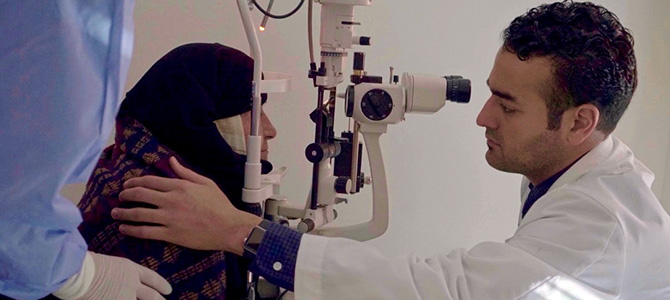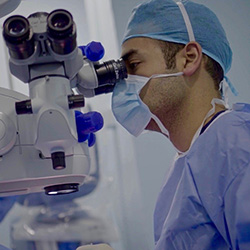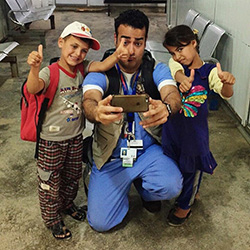
Alum Travels to Provide Care to Refugees

In the summer of 2016, after seeing news stories and social media posts about the hardships and trials of Syrian refugees, Soroosh Behshad, MD, MPH, decided he needed to do something to help.
 Dr. Behshad wanted to use his career as a physician to effect change in his own community and internationally. Although the University of Arizona College of Medicine alum had no connection to Syria, he has always been interested in refugee health care.
Dr. Behshad wanted to use his career as a physician to effect change in his own community and internationally. Although the University of Arizona College of Medicine alum had no connection to Syria, he has always been interested in refugee health care.
“Why Syria? I wish I had a simple answer to this, as I am not Syrian and don’t speak the language," he said. “My family fled their home country of Iran in the mid-80s due to religious persecution for being members of the Baha’i faith. Being born into a refugee family, I wanted to help those who may not have the same benefits of being able to immigrate to the U.S. as we did.”
In August 2016, he began offering tele-ophthalmology consultations to first responders in Syria and consultation for management of difficult cases to hospitals in Syria. Dr. Behshad had been introduced to the far-reaching effects of telemedicine while training at the University of Arizona in Tucson and Phoenix.
“The idea of traveling across the globe to provide care to a group of people I have no connection to was fostered not only by my upbringing, but also through the many free clinics and extracurricular activities I was involved with through my undergraduate and medical training at the University of Arizona,” Dr. Behshad said.
He continued to research non-governmental organizations who were directly involved with refugee care and began collaborating with the Syrian American Medical Society to set up ophthalmological care for Syrian refugees living in refugee camps in Jordan. Since January 2017, he has traveled every few months to Jordan to provide surgical and clinical eye care for refugees.
Initially, he started by providing cataract surgery, eye injections, laser procedures and giving out glasses. After the first trip, Dr. Behshad noticed a large incidence of amblyopia in children. Amblyopia, if not treated, can lead to irreversible blindness. Normally, the condition is diagnosed during routing screenings in school. But most of the refugee children were not in school and worked to support their families, so the blindness caused by amblyopia had been missed. Since then, Dr. Behshad has set up a pediatric vision screening program in the camps to test for amblyopia and treat it.
While his trips are meant to provide care and establish a sustainable ophthalmology system, he also is conducting research by collecting data about the refugees.
“I know we are providing care by traveling to Jordan and providing care to the refugees, but I also have gained so much, maybe even more than the refugees,” Dr. Behshad said. “For example, after returning from my first trip, I wanted to do more to help the underserved and potential refugees in the Atlanta area. With the help of Emory University ophthalmology residents and medical students, we started a full-fledged clinic offering complete eye care for free to the underserved with an emphasis on refugees living in the area.”
Dr. Behshad graduated from the University of Arizona College of Medicine in 2011. He started in Tucson for his first two years and was part of the last class to come to Phoenix for their third- and fourth-year. Dr. Behshad received his undergraduate degree in nutritional sciences and biochemistry in 2006 from the University of Arizona in Tucson and a master’s degree in public health from the Mel and Enid Zuckerman College of Public Health in 2008.
 “I knew I wanted to be involved with global work and after looking into it, I realized the great demand to improve ophthalmology care internationally,” he said. “On a daily basis, I work with medical students, residents and corneal surgery fellows, and I try to instill the same excitement in medicine and ophthalmology in our trainees that was instilled in me by the great mentors I had at the College of Medicine.”
“I knew I wanted to be involved with global work and after looking into it, I realized the great demand to improve ophthalmology care internationally,” he said. “On a daily basis, I work with medical students, residents and corneal surgery fellows, and I try to instill the same excitement in medicine and ophthalmology in our trainees that was instilled in me by the great mentors I had at the College of Medicine.”
Those great mentors who helped him further his research and training include Mandi Conway, MD, interim chair of the Department of Ophthamology at the college, and Gholam Peyman, MD, a clinical professor in Opthalmology. Drs. Conway and Peyman worked with Dr. Behshad during medical school and his residency at Tulane University, where they said he flourished as an exemplary resident.
“We found Soroosh to be an intelligent, hard-working, and caring medical student interested in ophthalmology and research,” Drs. Conway and Peyman said in an email. “Soroosh was very much respected by his peers and the faculty for his organizational talent, meticulousness and his sense of humor. We found him to be very kind and humorous, possessing a vast array of talents. We are very proud of him for choosing an academic career in ophthalmology.”
Dr. Behshad completed his residency at Tulane University in New Orleans and a fellowship in cornea, refractive surgery and external diseases at the Gavin Herbert Eye Institute at the University of California, Irvine. He currently works as a professor at Emory University in the department of ophthalmology. His area of expertise is cornea, refractive and cataract surgery.
“When I look back at my schedule, weeks that I am busier, I am actually happier and content as not only do I love what I do, but the feeling of enacting change and improving the lives of my patients gives me energy to keep going,” he said.
Topics
About the College
Founded in 2007, the University of Arizona College of Medicine – Phoenix inspires and trains exemplary physicians, scientists and leaders to advance its core missions in education, research, clinical care and service to communities across Arizona. The college’s strength lies in our collaborations and partnerships with clinical affiliates, community organizations and industry sponsors. With our primary affiliate, Banner Health, we are recognized as the premier academic medical center in Phoenix. As an anchor institution of the Phoenix Bioscience Core, the college is home to signature research programs in neurosciences, cardiopulmonary diseases, immunology, informatics and metabolism. These focus areas uniquely position us to drive biomedical research and bolster economic development in the region.
As an urban institution with strong roots in rural and tribal health, the college has graduated more than 1,000 physicians and matriculates 130 students each year. Greater than 60% of matriculating students are from Arizona and many continue training at our GME sponsored residency programs, ultimately pursuing local academic and community-based opportunities. While our traditional four-year program continues to thrive, we will launch our recently approved accelerated three-year medical student curriculum with exclusive focus on primary care. This program is designed to further enhance workforce retention needs across Arizona.
The college has embarked on our strategic plan for 2025 to 2030. Learn more.